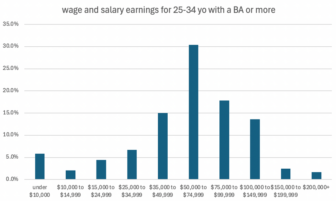Amazing new data from the Census Bureau. 2011 is the first year in a century that central cities grew more than their suburbs. (See this MSNBC story for details.) Talk about a seismic change. Cities showing higher population gains compared to their suburbs last year include Atlanta, Denver, Washington, D.C., Charlotte, N.C., Boston, Chicago, New York, Philadelphia, Minneapolis and Seattle. A list you want to be on! These are some of the most prosperous places in the country.
Is it the start of a long term trend or just a blip? Who knows? But all the evidence points to sustainable rising demand for central city living. The story of the central city resurgence can be explored in Alan Ehrenhalt’s new book The Great Inversion. Ehrenhalt documents the growing number of the affluent returning to central city living, particularly young professionals. Regions that do well will be those which have both strong suburbs and a vibrant central city. It is not either/or, but rather and/both.
As Ehrenhalt describes: “The cities that are gaining ground in the postindustrial world are cosmopolitan and diverse, and for the most part tolerant.” Something that Michigan’s cities, particularly Detroit, are still struggling with. Not welcoming, people aren’t coming.
Roy Roberts, DPS Emerging Manager deserves praise for his courage in addressing the issue head on. Mlive reported: Detroit Public Schools Emergency Manager Roy Roberts said that old-fashioned ideas about who’s a real Detroiter is holding the city back as it tries to move forward. “Detroit is a city that’s so proud of being a black city that it hurts us,” Roberts said at the first Detroit Business Conference today. “We’ve got to get over this race issue.”
The good news is that cities are in demand again. Big cities – potentially including Detroit, Grand Rapids and Lansing – that are welcoming and able to reinvent themselves can be prosperous again. The new reality is that the folks wanting to live in cities don’t look like the folks that have lived there for the past generation or so. Cities that succeed will be those that adjust to meet the needs of new residents.
Taking advantage of this change in consumer preferences matters to all of us. The most prosperous states nearly always have even more prosperous big metros anchored by vibrant central cities. An essential ingredient in recreating a high prosperity Michigan is city leadership that can take advantage of this opportunity and regional and state leadership that supports them.






